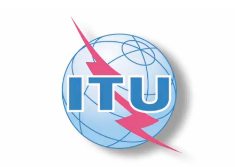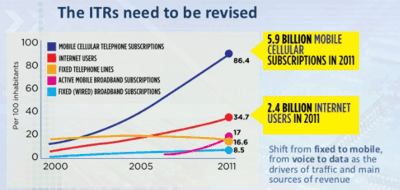| ITU - A Danger To The Free Internet? |
| Written by Alex Armstrong | |||
| Friday, 16 November 2012 | |||
|
Internet campaigning organizations are calling on governments to oppose handing over key decisions about the internet to the ITU at next month's World Conference on International Telecommunications. to be held from December 3-14 in Dubai.  The current ITRs were last negotiated in 1988 and, according to the ITU:
there is broad consensus that the text now needs to be updated to reflect the dramatically different information and communication technology (ICT) landscape of the 21st century.
 (click slide to expand)
Over 1500 delegates will gather for WCIT-12 in Dubai December 3-14 to discuss and debate proposals for a new set of ITRs. Proposed changes or additions to the ITRs can be summarized under the following headings:
The fear expressed by the campaign groups Access and Fight for the Future which advocate freedom for internet is that this conference could result in a binding international treaty that could change the internet as we know it. Their take on the proposals is that they could legitimize monitoring and blocking online traffic, threaten privacy, seek to impose new fees for accessing content, or could very well slow down connection speeds.
According to Access the problem is not so much what might be decided but how the decisions would be made: If some proposals at WCIT are approved, decisions about the internet would be made by a top-down, old-school government-centric agency behind closed doors.
Its video which also acknowledges that the ITU does good work expresses their concern that, whereas the internet was designed in an open and inclusive way, it is now at risk from the one government-one-vote model of the ITU that could mean that the future of the internet is determined by authoritarian countries. It concludes by highlighting the need to preserve: the openness, pragmatism and bottom-up governance that made the Internet so great. It then invites signatures here to tell governments to oppose handing over key decisions about the net to the ITU. The ITU for its part, has produced a "myth busting" slide presentation, which refutes the idea that WCIT-12 is about the ITU or the UN extending its mandate so as to control the internet Instead it argues that WCIT-12 is an opportunity: to create a pathway to a sustainable and inclusive global communication system of the future. The presentation also counters the idea that decisions made about ITRs could be dominated by authoritarian governments, stating that no proposal to the WCIT will be accepted unless it has wide support, that decisions are usually made by consensus and each country is free to refuse to sign or ratify the finally agreed text.
Despite further reassurances given in this video by ITU Secretary, Dr Hamadoun I.Touré, there is still room for concern that despite the best of intention of the ITU any decision making process that takes place behind closed doors has the potential to curtail the freedom that the internet currently has. It may not be perfect but attempts to regulate it may end up doing more harm than good. More InformationAccess ITU Campaign Sign-Up page Related ArticlesACTA Decisively Rejected by European Parliament Internet Defense League - Bat Signal for the Internet
Comments
or email your comment to: comments@i-programmer.info
To be informed about new articles on I Programmer, install the I Programmer Toolbar, subscribe to the RSS feed, follow us on, Twitter, Facebook, Google+ or Linkedin, or sign up for our weekly newsletter.
|
|||
| Last Updated ( Friday, 16 November 2012 ) |

